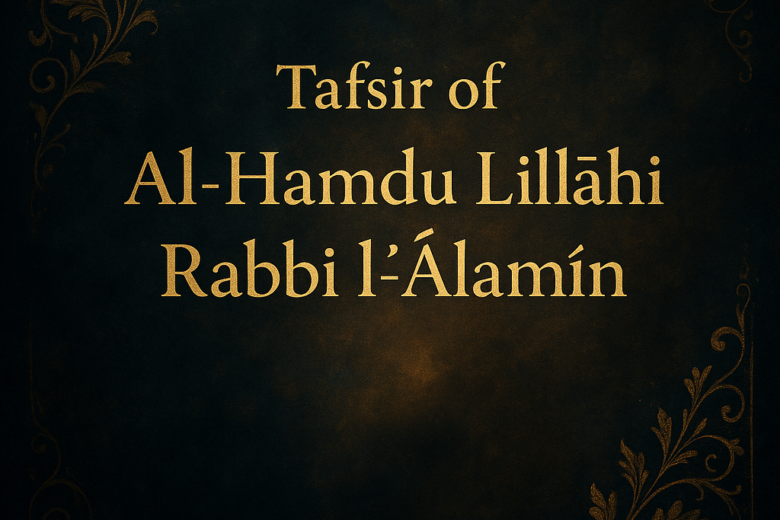🎯 {الحمد} — al-Ḥamd (The Praise)
- الحمد: Praise for that which is beautiful — whether it be a blessing (نعمة) or something else — expressed only by the tongue (باللسان وحده).
- Its opposite: الذم (blame or censure).
- ⚖️ It is not the reverse of مدح (praise), contrary to Ibn al-Anbārī, because:
- The two are equal in morphology (التصريفات).
- However, madḥ may relate even to inanimate objects, e.g.:
- You praise a jewel (تمدح جوهرة).
- But you do not say: تحمد جوهرة.
🧠 Difference Between “al-Ḥamd” and “al-Shukr”
- There are three scholarly views:
- الحمد and الشكر mean the same thing.
- الحمد is broader (أعم).
- الشكر is praise of Allah based on His actions, while الحمد is praise of His attributes.
- ✅ Most correct view: الحمد is more general (أعم).
💡 Therefore, the ḥāmid (praiser) is of two kinds:
- شاكر – One who is thankful (for actions).
- مثنٍ بالصفات – One who praises divine attributes.
🎯 {لله} — li-llāh (To Allah)
- The لـ (lām) can indicate:
- Ownership (لِلملك) — e.g., “That wealth is for Zayd.”
- Granting (للتمليك) — e.g., “I gave you a dinar.”
- Entitlement (للاستحقاق) — He deserves it.
- Attribution (للنسب) — e.g., “Zayd has an uncle.”
- Reason (للتعليل) — e.g., {لِتَحْكُمَ بَيْنَ النَّاسِ} [النساء: 105]
- Conveyance (للتبليغ) — “I said to you.”
- Amazement (للتعجب) — {هِيتَ لَكَ} [يوسف: 23]
- Clarification (للتبيين) — to specify the purpose.
- Result (للصيرورة) — e.g., {لِيَكُونَ لَهُمْ عَدُوًّا} [القصص: 8]
- Time/place (للظرفية) — e.g., {سَقْنَاهُ لِبَلَدٍ مَيِّتٍ} [الأعراف: 57]
- Limit (للإنتهاء) — e.g., “Until that moment.”
- Elevation (للإستعلاء) — e.g., {وَيَخِرُّونَ لِلأَذْقَانِ} [الإسراء: 109]
📌 In this verse, the لـ is for الاستحقاق — “Praise is deserved by Allah.”
🎯 {رب العالمين} — Rabb al-ʿĀlamīn (Lord of the Worlds)
- الرب means:
- The Master (السيد)
- The Owner (المالك)
- The Sustainer (الثابت)
- The Worshipped One (المعبود)
- The Reformer (المصلح)
- Some also include: The Companion (الصاحب), referencing this poetic line: فدنا له رب الكلاب بكفه
بيض رهاف ريشهن مقزع 📝 He approached, the lord of the dogs in his hand, sharp white blades with fine feathers.
🌍 “العالمين” — al-ʿĀlamīn (The Worlds)
- It is a plural without a singular, like الأنام.
- Derives from:
- العلم (ʿilm) — knowledge.
- العلامة (ʿalāmah) — sign.
- Its meaning varies:
- Every soul-bearing being, said Ibn ʿAbbās.
- People, said al-Bajali.
- Humans, jinn, angels, again from Ibn ʿAbbās.
- Humans, jinn, angels, devils, said Abū ʿUbaydah and al-Farrāʾ.
- Two weighty creatures (الثقلان): humans & jinn — Ibn ʿAṭiyyah.
- Descendants of Adam, said Abū Muʿādh.
- People of Paradise and Hell, said al-Ṣādiq.
- All the provided for, said ʿAbd al-Raḥmān ibn Zayd.
- All created beings, said al-Ḥasan and Qatādah.
- Spiritual beings (الروحانيون), said others.
📚 Many early scholars reported different views — Allah knows best which is accurate.
🎯 Qirā’āt (Recitations) of “الحمد”
- The majority of reciters read it as:
👉 “الحمدُ” — with a ḍammah on the dāl (nominative). - Ibrāhīm ibn Abī ʿUblah: matched the mīm to the lām of “lillāh” due to the ḍammah on “ḥamd”.
- al-Ḥasan and Zayd ibn ʿAlī: changed the dāl to kasrah to match the lām (a rare case).
- This involved making the declined word follow an indeclinable, which is unusual.
- In al-Ḥasan’s reading, it’s possible the matching occurred:
- In nominative or accusative, making the grammatical case hidden due to this match — as in elided or merged cases.
🧠 Other Readings
- Hārūn al-ʿAtakī, Ruʾbah, Sufyān ibn ʿUyaynah: read “الحمدَ” (with naṣb – accusative).
📚 “الحمد” as a Verbal Noun (مصدر) Defined by “أل”
- It may be:
- For familiarity (للعهد) — the praise known among you is for Allah.
- For essence (تعريف الماهية) — like “A dinar is better than a dirham.”
→ i.e., Any dinar is better than any dirham. - For genus (تعريف الجنس) — to include all types of praise.
📝 By default, ḥamd is not pluralized, as it is a maṣdar.
But Ibn al-Aʿrābī narrated a plural: “Aḥmad” (أحمد) — due to the diversity of praise.
📜 Poetic reference:
وأبلج محمود الثناء خصصته
بأفضل أقوالي وأفضل أحمدي
🌟 A radiant one praised in words, I favored him with my best sayings and finest praises.
🔹 Raised Case (ٱلۡحَمۡدُ): Why It’s Preferred
✅ The nominative form “ٱلۡحَمۡدُ” (with damma) is considered more meaningful and complete, which is why:
- 📚 All Seven Canonical Reciters (القرّاء السبعة) unanimously chose it.
- 🎯 It indicates that praise is firmly established and permanently belongs to Allah.
- This includes:
- His own praise of Himself.
- And others’ praise of Him.
- This includes:
🔹 The Meaning of the لام (lām) in “لِلَّهِ”
✅ The lām (لـ) here signifies ownership and full entitlement (الاستحقاق).
“To Allah” means that He alone deserves all praise.
🏷️ Accusative Case (ٱلۡحَمۡدَ): Alternate Reading and Its Implications
(Though not the canonical reading, scholars discussed it grammatically.)
🔸 If read in the accusative form (with fatḥa as in “ٱلۡحَمۡدَ”), then:
- It requires an implied verb (عَامِل):
- Example: “أحمد الله” – “I praise Allah”
- Or: “حمدت الله” – “I have praised Allah”
- This structure:
- 💡 Narrows the praise to the speaker’s action (i.e., the praise is now tied to who is doing it).
- ✨ Implies renewal or occurrence in time (i.e., not necessarily permanent).
🧾 In such a case, “الحمد” becomes a source noun (مصدر):
- Its verb is omitted, and it stands in its place.
- A common grammatical style in Arabic expressions:
- “شكراً” (Thanks!)
- “لا كفراً” (Not disbelief!)
- Example: “اللهم ضبعاً وذئباً” (O Allah, [protect from] hyenas and wolves) — the verb is omitted.
🏷️ Other Interpretations of the Implied Verb (عامل)
Some grammarians suggested the verb might not even derive from ḥamd (praise), but:
- Could be something like:
- “أقول الحمد لله” – “I say: praise belongs to Allah”
- “الزموا الحمد لله” – “Stick to: praise belongs to Allah”
🔎 However, the first interpretation (implying an omitted verb like “أحمد”) is considered more accurate, because:
- 💬 It directly aligns with the wording and intention of the verse.
🏷️ What’s the Role of لِلَّهِ in the Accusative Reading?
🔸 In this structure, the lām (لـ) in “لِلَّهِ” serves a different role:
- It’s not for possession (استحقاق) but clarification (التبيين).
- Like saying: “أعني لله” – “I mean: for Allah”
❌ It cannot function as a causative tool (i.e., making the verb transitive), because:
- The source noun (like “الحمد”) can’t take objects directly.
- Evidence: You can say “سقياً لزيد” (a drink for Zayd), but not “سقياً زيداً” (you can’t make Zayd the object directly).
✔️ So, “لِلَّهِ” in this reading is not the object of the noun “الحمد”, but tied to another implied verb.
🔍 Linguistic Analysis of “رَبّ العَالَمين” in Recitation
🏷️ Variations in Recitation 🎤
- Zayd ibn ʿAlī and a group recited “رَبَّ العَالَمِينَ” (in the accusative case) — 🔹as an expression of praise (على المدح).
- 💡 This is linguistically eloquent, except when followed by genitive adjectives (like: “الرَّحْمٰنِ الرَّحِيمِ”) — in that case, it loses strength because: ❗ There is a grammatical principle: no apposition (اتّباع) follows a detachment (قطع) in adjectives.
🏷️ How It Was Recited by Zayd ibn ʿAlī
📌 According to al-Ahwāzī, Zayd ibn ʿAlī recited:
- “رَبَّ العَالَمِينَ، الرَّحْمٰنَ، الرَّحِيمَ” — all three in accusative (نَصب).
✅ This removes the weakness, since the sequence maintains grammatical consistency.
🏷️ Grammatical Interpretations 🧠
- The weak view:
➖ “رَبَّ” is taken as an object of an implied verb like:
“نَحْمَدُ اللهَ رَبَّ العَالَمِينَ” (We praise Allah, the Lord of the worlds).
🚫 This is grammatically weak, because: It relies on mental inference (التوهم) — something more common in conjunctions (العطف) but not standard in other structures. - Another weak view:
➖ That “رَبَّ” is a substitute (بدل).
❌ But this is invalid due to interruption by the phrases “الرَّحْمٰنِ الرَّحِيمِ”.
🏷️ On the Word “رَبّ” 📚
- Grammatically, “رَبّ” may be:
- A verbal noun (مصدر) used as an adjective.
- Or a derived active participle (اسم فاعل), originally راب, with the alif dropped, just like:
- بارّ (righteous), بِرّ (righteousness).
🕌 The word “الرَّبّ” was reserved for Allah alone.
- For others, it always comes qualified:
- 🏠 “رَبّ الدَّار” (master of the house)
🏷️ “العَالَمِين” – Who Are They? 🌍
- The “al” (أل) in “العالمين” indicates universality (الاستغراق).
- 🔹 “ʿĀlam” is already a collective noun, so its plural is:
- Rare (شاذ) → “العالمين”
- Even rarer (أشذّ) when ending with و+ن — this form breaks typical grammatical rules.
🏷️ Who Does “العَالَمِين” Refer To? 👥
✅ The preferred opinion:
It refers specifically to those held accountable (المكلفين) — i.e. humans and jinn.
🕊️ Supported by the verse:
﴿إِنَّ فِي ذَٰلِكَ لَآيَاتٍ لِّلْعَالَمِينَ﴾
“Indeed in that are signs for the worlds.”
📍[Sūrah al-Rūm, 30:22]
- The recitation of Ḥafṣ with a kasrah on the lām (العٰلَمين) supports this view.

